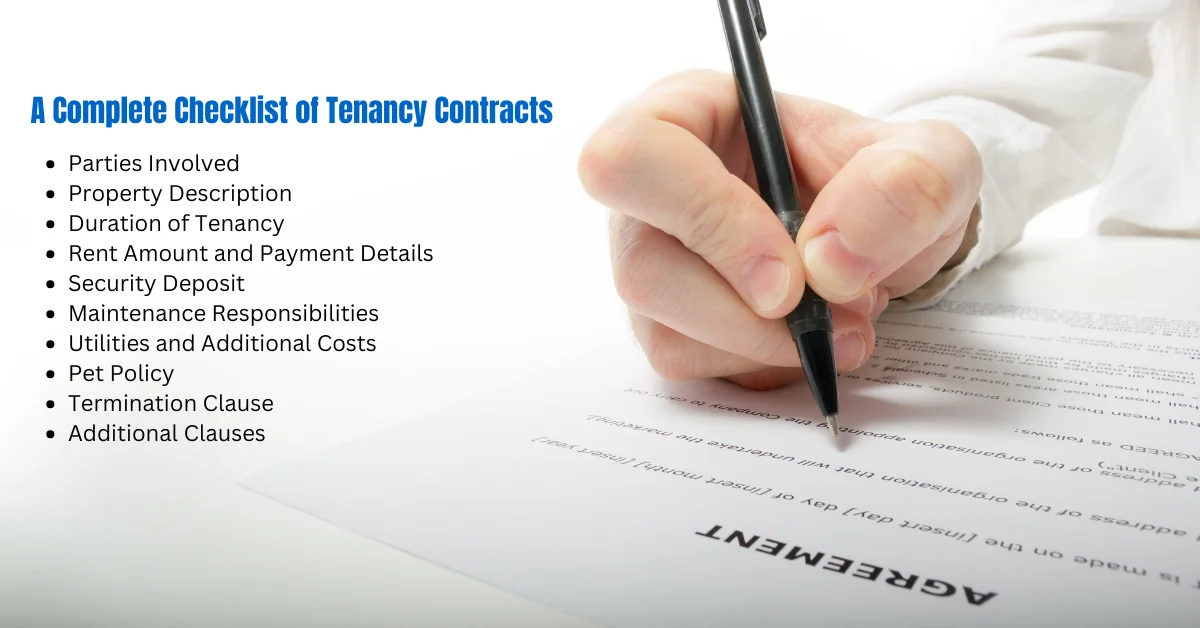
Are you ready for your new life in Dubai? The search for the perfect home doesn’t end at the search engine or on the homepage of your real estate agent. Part of knowing your way around tenancy is being able to comprehend and fulfill the requirements of a tenancy contract – this is a legal requirement that covers most of your renting experience. Indeed, Dubai City highly depends on modern infrastructure to provide people with different opportunities and living conditions that suit both expatriates and locals. Yet, the legal structure and legal aspect of tenancy contracts in Dubai may appear to be a Herculean task for even seasoned property hunters.
In this ultimate guide, MAP Real Estate the leading real estate agency in Dubai will take you through the checklist to help you develop the perfect tenancy contract that will protect you from any inconvenience during the process of paying rent in Dubai.
What is a Tenancy Contract?
A tenancy contract (Ejari) refers to an agreement that exists between the owner of a particular property and the tenant who seeks its occupation. However, it must be noted that the lessee of any of the property succinct in the Emirate of Dubai is to ensure that the property lease agreement is registered in the Ejari system alone.
Most of the key issues to do with the landlady and the landlord including the period of tenancy and rentals, payment, usage of utilities, maintenance issues, and repercussions for violation of the tenancy contract are grasped in the tenancy contract. The formation of the contract has to be in compliance with either the Rental Dispute Settlement Centre (RDC) in Dubai or the Dubai Land Department (DLD) depending on the area of the property.
The legal framework governing tenancy contracts in Dubai is shaped by the following laws and resolutions:
- The Federal Law No. 26 of 2007 concerning Real Property.
- Decree No. 9 of 2009
- Cabinet Resolution no 57/2013
- Decree No (35) of 2018 Concerning the Adjustment of Rent Values
Knowledge of these laws and clauses is important when drawing up a tenancy agreement that shall satisfy the two parties.
A Complete Checklist of Tenancy Contracts:

1. Parties Involved:
The tenancy contract contain the names and identification numbers along with Rental Good Conduct Certificates of both the landlord and the tenant. This information makes it clear and makes those involved in the rental deal accountable, relating back to the property.
2. Property Description:
It is crucial to give as much detail of the property as possible. These should be the specific address, the kind of housing (flat, villa, etc.), and characteristics (the number of bedrooms, parking space, balconies). Avoiding minor issues that may be forgotten in the process of selling a property is facilitated by thorough property descriptions.
3. Duration of Tenancy:
Explain when the proposed agreement of leasing is supposed to begin and where it is supposed to end. It should also contain provisions of renewal or early termination of the contract together with the periods of notice for each. Getting to know the agreed-upon length of tenancy helps avoid misunderstandings and disputes later on.
4. Rent Amount and Payment Details:
Whether in monthly installments, on an annual basis whatever it may be, state clearly the amount of rent and how and when it will be paid. Also, specify the way of payment that one is supposed to accept, explaining all the agreed payment conditions.
5. Security Deposit:
Further, the security deposit clause must state a specific amount, other terms regarding its refund, or any other process related to it. It’s recommended to be clear on this sum and the process of its return because disagreements in everything can create tension and a lack of trust between the landlord and the tenant.
6. Maintenance Responsibilities
Describe who will be responsible for the maintenance of equipment, machinery, and structures of the business. It will also help in avoiding misunderstanding between the landlord and the tenant to state clearly which of the duties are expected of the landlord. The maintenance clause should be drafted properly to provide comfortable well-maintained surroundings to both the parties.
7. Utilities and Additional Costs:
Check if the applicable rent covers the water charges, the electricity charges, the internet charges, etc., or not and if not, then the tenant has to pay them. This improves transparency, eliminating poor relations and fighting over the finances of the property.
8. Pet Policy:
A specific clause regarding pets has to be incorporated into the tenancy agreement if you are likely to have a pet. Indicate whether pets are permitted, if so, the charges, and deposits that come with it, or if there are limitations on the type or size of the pet allowed. Moreover, the pet policy must be clearly developed to offer a good living condition for every person.
9. Termination Clause
It is important for a tenancy contract in Dubai if there is a clear provision on how the tenancy may be terminated. It should elaborate as to when each of the parties is entitled to unilaterally amend or cancel the contract, and how much notice must be given. This means that the drafting of a clear and precise termination clause reduces the conflict of interest between the landlord and the tenant.
10. Additional Clauses
Make an addition to any terms that may not have been provided by the standard template of your lease. These could include limitations on usage; such as no smoking within the property or clauses for dealing with conflict. Forced provisions mean a contractual document that is developed specifically to meet the needs of the specific client.
Important Points in a Tenancy Contract:
Understanding Legal Terminology:
It is important that before a description of the tenancy contract, one learns some of the common legal terms that might be used. This in turn educates tenants on their contractual rights and enables them to make informed decisions. Some key terms include:
- Rent: The sum of money many times in money the tenant contributes to the landlord towards the use of the property.
- Security Deposit: A fixed amount of money given out to the landlord by the tenant at the start of tenancy sometimes referred to as a security deposit and often reimbursable on completion of the tenure of the tenancy.
- Lease Term: The length of the tenancy contract is normally restricted to a certain number of years or it can be renewed indefinitely, which may be for a limited time only such as 6 or 12 months.
- Tenancy Contract: A tenant’s document that gives details of rights, duties, opportunities, and obligations between the landlord and the tenant.
- Ejari: Ejari is the online rental registration platform officially recognized in Dubai that guarantees the validity of the tenancy contract.
Reviewing the Contract:
So if you’re going to be living there for some time, you should always take time to go through the tenancy agreement and understand what it says, because that’s going to affect your tenancy in the future. When scrutinizing the document, keep an eye out for the following potential red flags:
- Other costs which were not initially agreed upon by the members of the credit union.
- Hopefully using unfair rental conditions that may cause conflicts in the future.
- Misinformation about the features or the state of the property such that the buyer gets the wrong picture when making a decision.
- Unclear renewal clauses, therefore creating doubt about the company’s future in the property.
- No clear arrangements when it comes to raising rent, maintenance, or even repair whenever the need arises.
Creating an Addendum:
Feasibly, if your tenancy comes with certain conditions that need altering or other peculiarities that might need covering, then you should consider the preparation of an addendum. This document should be attached to the original tenancy contract and outline any modifications to the agreed-upon terms, such as:
- Plain bore or flexible lease terms or conditions, according to the client’s preference.
- Adjustment to the rental fee based on different aspects, such as improvement on the house or on the utilities.
- Detail areas of concern concerning who does the maintenance or who does the repair.
The Role of the Ejari System:
The Ejari registration system in Dubai is extremely useful in legitimizing a tenancy contract. On this website, it is rather simple to register rental deeds and makes it easier for landlords as well as those renters who are willing to make deals and transactions. To use the Ejari system, follow these steps:
- Apply online and attach the tenancy agreement document.
- Complete the registration process by using a credit card or any other acceptable method of payment.
- After finalizing the form, you get an email of approval alongside the Ejari registration number thus proving the authentic nature of your tenancy contract.
Documentation to Keep:
Documented evidence of your tenancy exists in such documents, and for that, you need them because they contain the rental agreement, among other writings. Keep organized records of:
- The tenancy agreement and registration of Ejari copy that has been signed.
- Invoices for any amount paid, such as rent, utility bills, and maintenance charges.
- The terms of the tenancy or any communication made to the landlord or a real estate agent about the property.
- Records of agreed-upon repairs or maintenance with receipts and photo evidence wherever possible.
How MAP Real Estate Can Help You?
At MAP Real Estate the leading real estate agency in Dubai, we strive to ensure that you have a very easy time when it comes to your tenancy contract. Here are five ways our team can assist you:
1. Expert Guidance:
Our experienced staff will help you with all stages of concluding a tenancy contract, so you won’t lose sight of anything! We always attend to your requirements and preferences, to ensure that you make the right decisions on your rental process.
2. Tailored Contracts:
We provide individualized tenancy agreements flexible to meet your requirements and wishes, so you will be as comfortable as possible. Your lifestyle and expectations are going to be met when you rent with us because our focus is on offering personalized services in relation to rental services.
3. Navigating Legal Requirements:
Having worked for years in the field, we always make it easier for our customers to understand Dubai’s laws because we break down the technicalities of the law. Our team continues to monitor the basic changes in the law and verifies your tenancy contract meets the latest legal regulations.
4. Ongoing Support:
Have access to help at any time during your tenancy period — we don’t just stop serving you after signing the contract! Our experienced staff is always willing to attend to any inquiries that may arise during the rental period.
5. Access to Exclusive Listings:
Take advantage of brokers’ access to our unique property database so that you get that home that fits your needs. Through an immense and reliable contact base, skill as well as insight into specific rental markets, our ability to help you secure the perfect property is guaranteed.
6) Conclusion:
A good tenancy agreement is the key to a good rental experience within the emirate of Dubai. Recognizing the basics of what one should include in the contract could be helpful, as well as partnering with a reputable real estate company like MAP Real Estate. Educate yourself, be alert, and leave the task of helping you renting out your property in Dubai to our experienced team.

